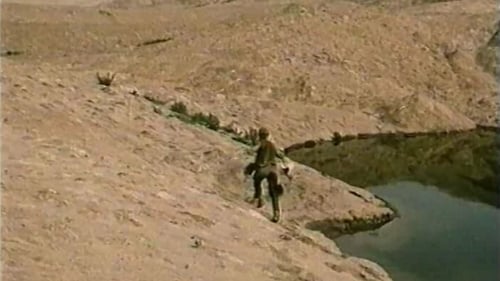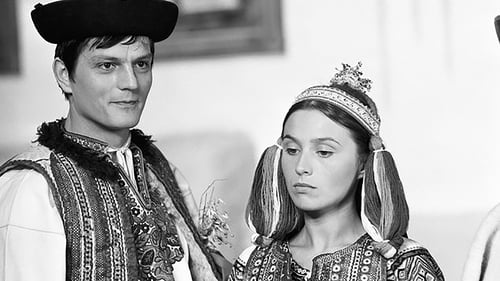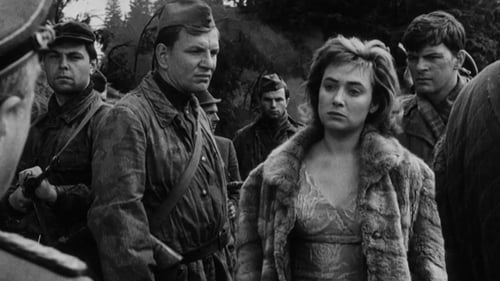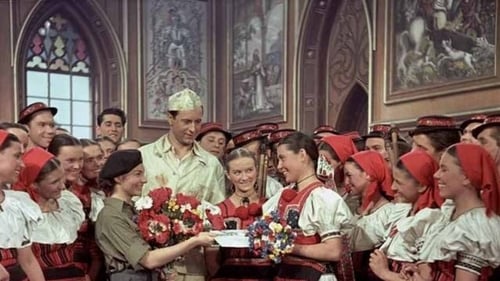Oľga Adamčíková
Nacimiento : 1903-02-17, Kremnica, Austria-Hungary [now Slovakia]
Muerte : 1992-08-16

Old Woman (segment "Pútnici")
An apocalyptic story of three wars in three film tales encompassing the end of the WWI,WWII, as well as a vision of the world destroyed by nuclear weapons. This film was honored at the film festivals in Venice and Sorrento. Immediately after that the copy with Italian subtitles was locked in a safe as evidence of the anti-communist activities of the director, who used real footage of the Soviet invasion.

Meranka

The drama offers Arnošt Pánek, chairman of the National Committee, as the protagonist of the story. Pánek is disturbed by news of the arrest of his protégé Kvasil – chairman of a JZD agricultural cooperative in the nearby village of Spádová. He is responsible for the revival of a neglected village, but is now accused of theft, fraud, and – on top of that – the rape of an under-aged girl.

Krotká is a 1967 Slovak black-and-white produced by TV a psychological drama directed by Stanislav Barabas on based a short story A Gentle Creature by Fyodor Dostoyevsky.

Katrina Targova
A dramatic story about two friends - fisherman Richardus and municipal executioner Emil Targo takes place at the river Danube, in places that used to be targets of Ottoman raids. But their attraction to the same woman and Emil’s betrayal change their indissoluble friendship to an equally strong hatred. And as it usually goes - after twenty years by a trick of fate Richardus’ daughter Agajka becomes the wife ofthe sun of his sworn enemy.

Růžičková (voice)
In this bitingly satirical film Peter Slovan, a continuous source of trouble for the film functionaries of the socialist Slovakia, tackles an evergreen topic – the corruptive effects of power. Barnabáš Kos, a triangle player at a symphonic orchestra, is suddenly promoted to serve as the head of the said institution, even though both he and his superiors deem him completely unfit for the task. Encouraged in equal parts by this unexpected recognition and the servile praise of his colleagues, Kos’s modesty starts to gradually vanish. The erstwhile bashful and aloof percussionist quickly becomes aware of the advantages of his new office, and begins to realise his increasingly ludicrous artistic ambitions. Ultimately, the submissive marionette turns into a source of public humiliation, and his astonishing career finds an abrupt end. Orchestra serves here as a microcosm that grotesquely reflects the absurd and tragicomic mechanisms of the paranoid apparatus of power.


Rozkova's villager called her mother
Pavel is a Czech partisan fighter in the waning days of the war. Just as peace is declared, Pavel is shot in the spine and sent to the hospital emergency ward. As he fades in and out of consciousness, he recalls the events that led to his participation in the underground. Holding German occupation commander Engelchen responsible for all the horrors and deprivations heaped upon his comrades, Pavel is kept alive by the possibility of recovering and exacting vengeance upon the Nazi officer - no matter how long it takes.

A bricklayer, Jozef Haviar, decides to live with his family on the small farm of his father through the difficult years of the economic crisis. But on his return to his father's house he gets into a conflict with his brother. The life-and-death conflict between the two brothers documents the difficult situation of Slovak country life in the 1930s, the time of economic depression.

Křístková
In southern Moravia, in the native village of Velka Samota, a ministry official returns from Prague to lift the declining JZD he helped establish.

A comedy about a lost inheritance, love and a red umbrella, which, according to a local legend, belonged to St. Peter himself.


Slovak movie is based on the novel by the prominent representative of Slovak prose František Hečka, who was in 1952 awarded the State Prize. The novel and the movie successfully capture the development of Slovak village after the liberation in 1945. The narrative is centred around the characters of the old Púplava, who after the liberation begins to organise a new village life, and his struggle for the construction of settlements Mrzáčky, burnt by the fascists. It is centred around the conflict, greatly reflecting the situation of the countryside at this time: the conflict between the rural poor and the rural rich. In the movie, a rich personal and emotional life of other heroes pulsate besides the main storyline. The movie ends with the final defeat of the reactionary forces by Communists in February 1948, taking over all power in the state of workers and peasants. - "The Wooden Village" is released in celebration of the 7th anniversary of the Communist February Victory.

Veronina matka
The first Slovakian colour film. A celebration of traditional Slovakian folklore and creativity expressed through a story of young love .

Rendková









